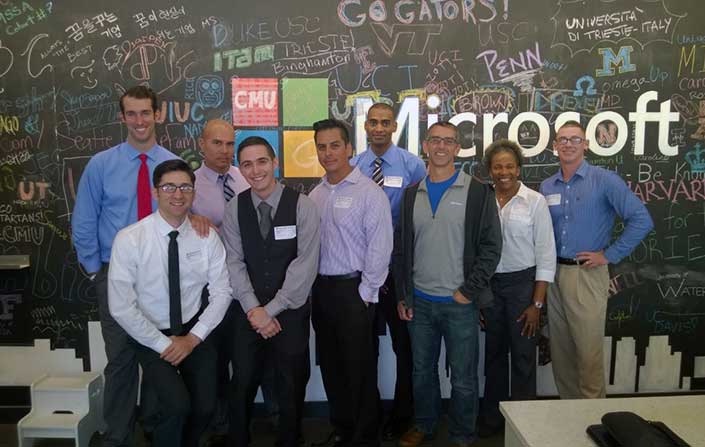Invested from the start: MSSA mentor volunteers more than 500 hours
When Erik Downing was first approached by Thomas Dawkins, senior business manager of military and veteran education at Microsoft, in October 2013 to develop materials for the budding Microsoft Software & Systems Academy (MSSA), he saw it as a great way to share some of the knowledge he’d gained in his 15 years at Microsoft. More than 500 volunteer hours (and counting) later, Downing, a program manager for the Legal & Corporate Affairs group, is seeing Microsoft reap the rewards of his — and others’ — commitment to developing and growing the program. MSSA is a technology skills training program for military service members with a scheduled separation date that helps them prepare for and secure careers in the IT industry after they transition out of the military. Though MSSA graduates are not guaranteed jobs at Microsoft, they are guaranteed an interview — and several have been hired. Those new hires are exactly what Downing was aiming for when he signed on to help.
“The initial focus of MSSA was to fill a big gap at Microsoft of test engineers. There were a lot of openings; it seemed like a good place to focus this program,” Downing said. “I thought that was a really exciting opportunity, from a Microsoft standpoint, to grab talent before anyone else does. And, if it takes a little bit of work on our part, and a little bit of training of folks, that’s great, too.”
Though he never served in the military, Downing recognized the untapped potential former service members represent to the IT industry, and he was excited to help build a program that would transform that potential into skilled employees. He spent the first several months in 2013 helping develop the materials and hands-on activities that form the MSSA curriculum. From there he became an MSSA mentor, where he works closely with MSSA cohorts to develop the soft skills needed to successfully transition from military to civilian life. He participates in weekly Skype training sessions with the entire class, and then meets with a smaller group of students once a week for more intensive advising. He typically logs about four hours per week, between preparation and the sessions.

“Most of what we do during mentoring sessions is soft skills. How do you talk to people, how do you interact, what should the expectation be of you, what should your expectation be of others,” Downing said. “Practicing that the interview is a conversation where you’re trying to get the person to like you — and feel confident that you’re the right person for this job. During the class I do a certain amount of pulling folks forward, but I also let them know that it’s their job to step up and get noticed, and that’s not just in this class environment, it’s through their whole careers.”
So how does a full-time Microsoft employee manage to fit in more than 500 hours of mentoring in addition to his day job?
“I definitely weave it into my workday. I schedule the Skype calls early, before there’s much going on at work,” Downing said. “And I’m able to flex my schedule for whatever is needed. I’ve had really good support from management — they all have a really supportive attitude.”
Putting in an extra four or so hours a week is well worth it, though, Downing says. Not only has it helped Microsoft fill several key positions in the company, it also helped Downing gain the experience needed for his own career transition. When he started working with MSSA, Downing was a software development test engineer and hoping to move into a program management role. His work with MSSA gave him hands-on, real-world program management experience, which helped him transition to his current role. And doing something meaningful has also given him personal satisfaction.
“It’s pretty common for folks who have been at a company for a long time — and are really good at their job — to begin to feel stagnant,” Downing said. “So if something really meaningful, like MSSA, comes up, I see it as a great way to burn some extra brain cycles and stretch myself — and that is energizing for me.”
The ultimate reward, though, is seeing MSSA grads succeed once they’ve graduated, either at Microsoft or at one of Microsoft’s partner agencies.
“Just recently a couple of folks in the last cohort I mentored — a couple folks that I really took an interest in — got offers,” Downing said. “Being able to give that feedback to the staffing group, and being able to see that all the way through, was really fulfilling.”
